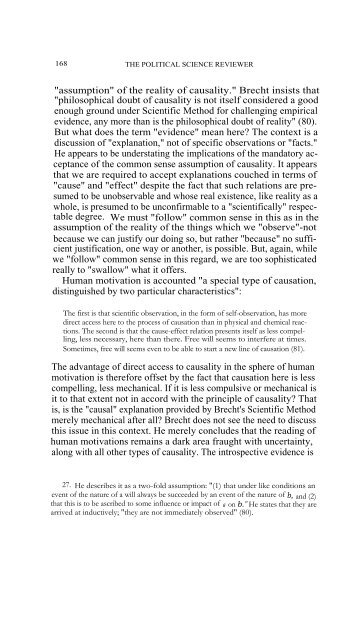ARNOLD BRECHT'S POLITICAL THEORY REVISITED Political ...
ARNOLD BRECHT'S POLITICAL THEORY REVISITED Political ...
ARNOLD BRECHT'S POLITICAL THEORY REVISITED Political ...
Create successful ePaper yourself
Turn your PDF publications into a flip-book with our unique Google optimized e-Paper software.
168 THE <strong>POLITICAL</strong> SCIENCE REVIEWER<br />
"assumption" of the reality of causality." Brecht insists that<br />
"philosophical doubt of causality is not itself considered a good<br />
enough ground under Scientific Method for challenging empirical<br />
evidence, any more than is the philosophical doubt of reality" (80).<br />
But what does the term "evidence" mean here? The context is a<br />
discussion of "explanation," not of specific observations or "facts."<br />
He appears to be understating the implications of the mandatory acceptance<br />
of the common sense assumption of causality. It appears<br />
that we are required to accept explanations couched in terms of<br />
"cause" and "effect" despite the fact that such relations are presumed<br />
to be unobservable and whose real existence, like reality as a<br />
whole, is presumed to be unconfirmable to a "scientifically" respectable<br />
degree. We must "follow" common sense in this as in the<br />
assumption of the reality of the things which we "observe"-not<br />
because we can justify our doing so, but rather "because" no sufficient<br />
justification, one way or another, is possible. But, again, while<br />
we "follow" common sense in this regard, we are too sophisticated<br />
really to "swallow" what it offers.<br />
Human motivation is accounted "a special type of causation,<br />
distinguished by two particular characteristics":<br />
The first is that scientific observation, in the form of self-observation, has more<br />
direct access here to the process of causation than in physical and chemical reactions.<br />
The second is that the cause-effect relation presents itself as less compelling,<br />
less necessary, here than there. Free will seems to interfere at times.<br />
Sometimes, free will seems even to be able to start a new line of causation (81).<br />
The advantage of direct access to causality in the sphere of human<br />
motivation is therefore offset by the fact that causation here is less<br />
compelling, less mechanical. If it is less compulsive or mechanical is<br />
it to that extent not in accord with the principle of causality? That<br />
is, is the "causal" explanation provided by Brecht's Scientific Method<br />
merely mechanical after all? Brecht does not see the need to discuss<br />
this issue in this context. He merely concludes that the reading of<br />
human motivations remains a dark area fraught with uncertainty,<br />
along with all other types of causality. The introspective evidence is<br />
27. He describes it as a two-fold assumption: "(1) that under like conditions an<br />
event of the nature of a will always be succeeded by an event of the nature of b, and (2)<br />
that this is to be ascribed to some influence or impact of a on b." He states that they are<br />
arrived at inductively; "they are not immediately observed" (80).
















